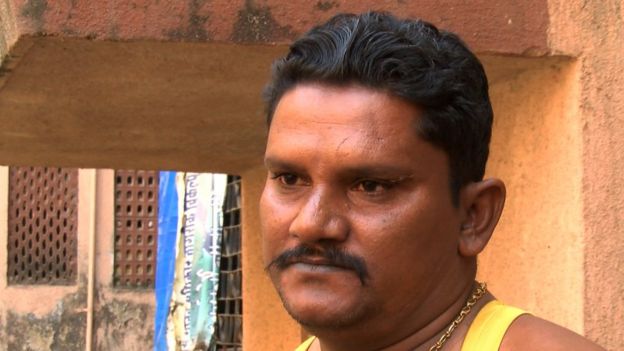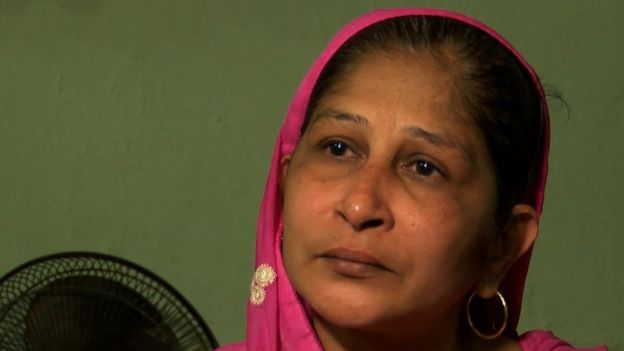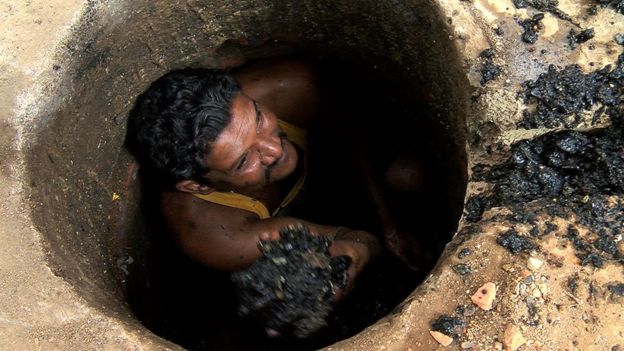Search This Supplers Products:Sewer Camerapipe inspection cameramanhole cameradrain cameraplumbing robot camerapush rod inspection camera
India's sewer workers risking their lives
time2016/04/05
On Sunday two workers suffocated to death while cleaning drain pipes in the southern city of Bangalore.
Two weeks ago, two sewer cleaners in Mumbai lost their lives while doing their job.
Unions claim they are among dozens of sewer workers who die in India every year because they are not given any safety equipment.
"When I lift my hand to my mouth to take a bite of food, I feel like it smells of sewage," says Binod Lahot, a sewer worker in Mumbai.
"But I still eat it. Why? Because I have to stay alive and go back to work tomorrow."
Mr Lahot doesn't know his age, but says he has been doing the job for more than 20 years.
Most days you'll find him in a hole in the ground, scooping out sludge with his bare hands, unblocking the city's sewer lines. It's a critical job, but workers like Mr Lahot get paid less than $5 (£3.50) a day.

He's often surrounded by swarms of cockroaches, and has no mask to protect him from the poisonous fumes that the sewage emits, but that's not the hardest bit of the job, according to Mr Lahot.
Some days he has to go much deeper underground with only a rope to help him, and he's scared that he could drown if he gets caught in a sudden rush of sewage. It's happened before.
Death rate
Ismail Kazi, a 45-year-old worker drowned while cleaning sewers in 2014.
In his one room home in a Mumbai shantytown, his wife Rehana Kazi says he chose to do this difficult and dangerous job so that he could educate his three children. Mrs Kazi breaks down as she tells me her eldest son has had to drop out of college to support their family.

According to a survey done by the sewer cleaners union in Mumbai, Mr Kazi was among 28 workers who have died in the city since May 2014.
Mumbai's municipal corporation does not have data specifically for sewer workers, but last year it said 1,386 conservancy workers had died over six years since 2009.
In addition to sewer cleaners, conservancy workers include all those who sweep the city's streets and ferry garbage to dumping areas.
The civic authority has commissioned a study to assess the reasons behind the number of deaths, but officers from the municipal administration declined to answer specific questions from the BBC on why no safety gear or insurance is offered to sewer cleaners.
One reason could be the way they're hired.
While the city's civic authority directly employs around 30,000 people to keep Mumbai clean, the more difficult and dangerous job of unblocking sewer lines is usually done by casual workers who are hired on a day-by-day basis through contractors, and so they're not eligible for medical or life insurance benefits.
B Samuel Banda is one of the contractors who hire sewer cleaners. I asked him why they don't provide safety gear.
"We do give them gloves and rubber boots sometimes," he says. "But it's a very unorganised sector.

"We work with different people every day and at the end of the day we go our separate ways. So getting insurance policies made for workers is difficult."
This isn't a problem unique to Mumbai. No national surveys have been conducted, but social workers estimate that around 100 sewer workers die every year across India.
In 2014, India's supreme court had ruled that the families of those who died while working in sewers since 1993 should be given around $15,000 (£10,000) as compensation. But many like Rehana Kazi are yet to see any money.
"We have got no help from the government. No one has even come to meet us," she says.
Last year the Indian government started collecting a separate tax from citizens to fund a major cleanliness campaign. Workers like Binod Lahot are integral to that plan.
And while theirs will always be a difficult job, it does not need to be such a risky one.
